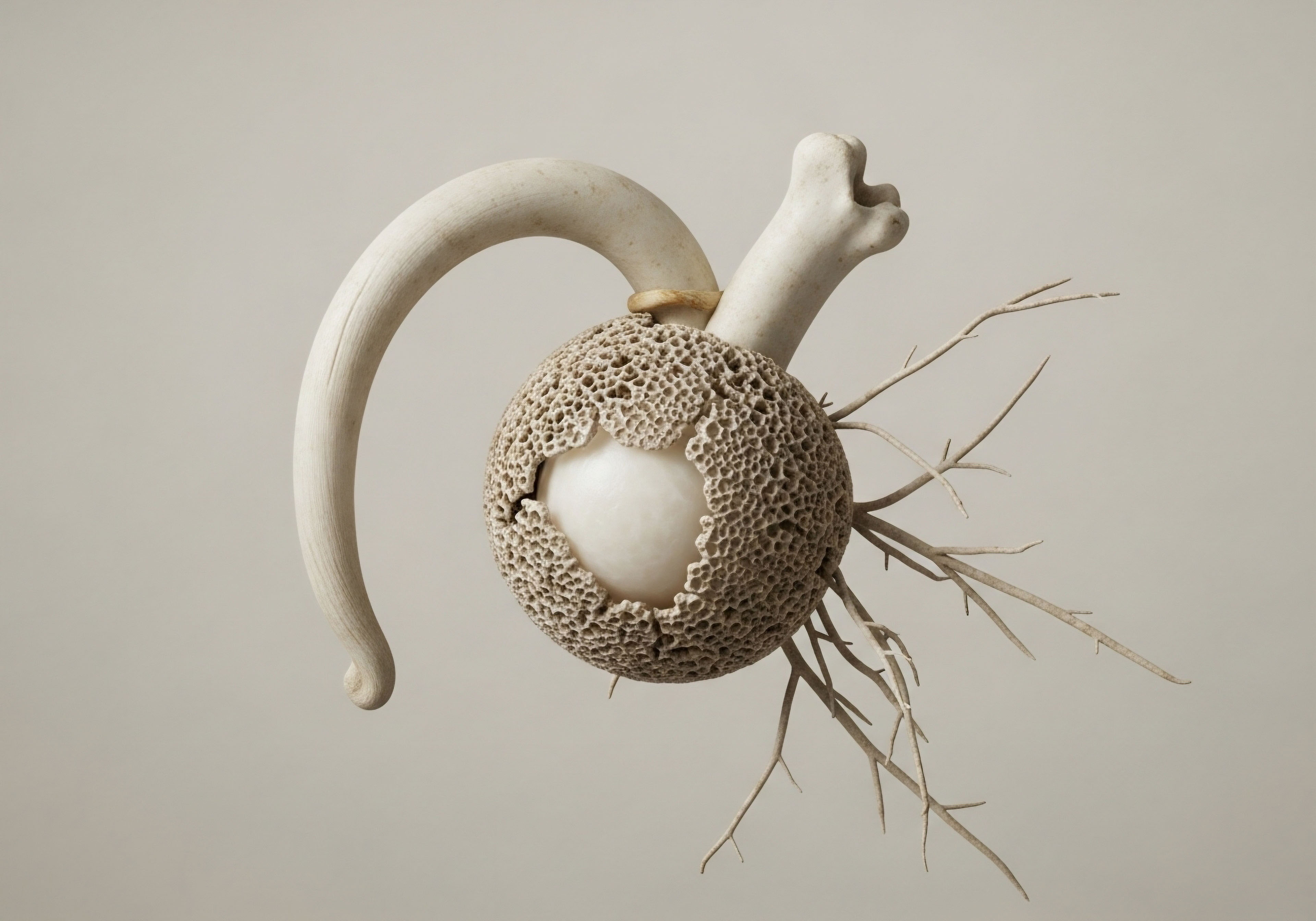

The Engine’s Blueprint Unveiled
Your biological architecture is a high-performance system, a complex interplay of biological signals orchestrating every facet of your existence. At its core, this system is governed by hormones ∞ potent chemical messengers that dictate not merely bodily functions, but the very quality of your lived experience.
These unseen conductors direct the tempo of your energy, the sharpness of your cognition, the stability of your mood, and the robustness of your physical capacity. To understand their influence is to grasp the fundamental drivers of your ultimate potential.

The Foundation of Vitality
Hormones like testosterone, often associated solely with masculinity, are fundamental to both sexes. In women, testosterone contributes to bone density, muscle mass, and energy levels, directly impacting drive and sexual function. In men, it is the primary driver of muscle development, bone strength, libido, and mental acuity. Its precise balance is a prerequisite for sustained physical power and mental vigor.
Estrogen, far from being solely a reproductive hormone, acts as a critical neuroprotectant and cognitive modulator. It influences memory, attention, and mood regulation. Post-menopause, a decline in estrogen levels correlates with diminished cognitive function and an increased risk of neurodegenerative conditions. Its presence is integral to maintaining brain health and emotional equilibrium across the lifespan.
Growth hormone (GH) plays a pivotal role in cellular regeneration, muscle synthesis, and metabolic regulation. Beyond its well-known function in childhood development, GH in adulthood supports tissue repair, maintains lean body mass, and influences fat metabolism. Its decline with age contributes to reduced physical resilience and altered body composition.
Cortisol, the body’s primary stress response hormone, is essential for managing energy and inflammation. However, chronic elevation due to persistent stress disrupts sleep, impairs cognitive function, and negatively impacts metabolic health. Its dynamic regulation is key to sustained performance and well-being.
Thyroid hormones regulate metabolism, influencing energy expenditure, body temperature, and the function of virtually every cell. Imbalances here lead to profound shifts in energy levels, cognitive clarity, and metabolic efficiency. Insulin, vital for glucose regulation, also impacts energy storage and utilization, with its dysregulation leading to metabolic dysfunction that broadly affects vitality.
These hormones do not operate in isolation. They form intricate feedback loops, with the brain’s hypothalamus and pituitary gland acting as central command centers. Understanding these hormonal relationships reveals the body as a finely tuned system, where adjustments in one area produce cascading effects throughout the entire biological network.


Mastering the Internal Chemistry
Achieving peak biological function requires a deliberate, informed approach to hormonal alignment. This is not about simply treating symptoms; it is about engineering your internal environment for superior performance and longevity. The strategies employed are layered, beginning with foundational lifestyle pillars and extending to precise therapeutic interventions when indicated.

The Pillars of Hormonal Harmony
Nutrition and Metabolic Regulation: The foods you consume directly fuel your endocrine system. A diet centered on whole, nutrient-dense foods supports stable blood sugar levels, preventing the disruptive cycles of insulin spikes and crashes that can impair hormonal balance. Strategic nutrient timing and quality caloric intake are essential for metabolic health, which underpins hormonal function.
Exercise as a Biological Catalyst: Resistance training is a potent stimulus for anabolic hormones, including testosterone and growth hormone, while enhancing insulin sensitivity. Cardiovascular conditioning improves metabolic efficiency and stress hormone regulation. The type, intensity, and frequency of exercise are calibrated to specific hormonal goals.
Sleep ∞ The Unseen Architect of Recovery: Sleep is not merely rest; it is the primary period for cellular repair, hormone regulation, and cognitive consolidation. Consistent, high-quality sleep ensures the optimal release of growth hormone and helps manage cortisol levels, directly impacting energy, mood, and physical recuperation.
Stress Management and Resilience: Chronic stress elevates cortisol, creating a cascade of negative effects on hormonal balance and cognitive function. Implementing practices such as breathwork, mindfulness, and structured recovery periods actively mitigates these detrimental impacts, fostering a resilient endocrine system.

Therapeutic Interventions ∞ Precision Engineering
When lifestyle modifications are insufficient, targeted therapeutic interventions become paramount. This involves a data-driven assessment of individual hormonal profiles through comprehensive biomarker analysis.
- Hormone Replacement Therapy (HRT): For individuals experiencing age-related or pathological declines in hormone levels (e.g. testosterone, estrogen, progesterone, thyroid hormones), HRT restores physiological concentrations. This is not about supra-physiological levels but about returning hormone systems to their optimal functional range, thereby improving energy, cognition, mood, and physical composition. Bioidentical hormones, chemically identical to those produced by the body, are often employed for their precise integration.
- Peptide Therapy: Specific peptide sequences act as signaling molecules, directing cellular processes with remarkable precision. These can target areas such as growth hormone release, cellular repair, immune modulation, and metabolic enhancement, offering a sophisticated layer of biological tuning.
“The endocrine system is a master regulator; its optimal function is not a luxury but a prerequisite for peak human performance and enduring vitality.”
The application of these interventions is always guided by rigorous scientific understanding and personalized physiological data, ensuring safety and efficacy.


Timing Your Biological Ascendancy
The efficacy and benefit of hormonal interventions are intrinsically linked to timing. Recognizing the natural arc of hormonal decline and understanding the principles of timely intervention are critical for realizing sustained vitality and mitigating age-related physiological shifts.

Navigating Age-Related Shifts
Hormonal levels naturally fluctuate throughout life. Puberty marks a surge, adult life maintains a relative equilibrium, and aging brings a gradual, yet significant, decline. This decline is not a passive process but one that directly impacts cognitive acuity, physical strength, metabolic flexibility, and emotional resilience.
For women, the transition through perimenopause and menopause represents a distinct period of hormonal recalibration. Estrogen and progesterone levels diminish, impacting not only reproductive health but also cognitive function, sleep quality, and mood.
While hormone replacement therapy can be beneficial at any age, the “critical window theory” suggests that initiating HRT within a specific timeframe around menopause (typically within ten years or before age 60) may confer the most significant long-term protective benefits for cardiovascular health and cognitive function. This period allows for the restoration of hormone levels before cumulative age-related changes become deeply entrenched.
Men also experience a gradual decline in testosterone and other hormones, often termed andropause. This shift can manifest as reduced energy, diminished libido, impaired cognitive function, and loss of muscle mass. While there is no single “critical window” as sharply defined as in women, proactive monitoring and intervention are essential for maintaining vitality and mitigating the health risks associated with low testosterone.
For many men, commencing testosterone replacement therapy when symptomatic and clinically indicated provides substantial benefits in energy, mood, and physical capacity.

The Immediate and Long-Term Impact
The onset of noticeable benefits from hormonal interventions varies. Subtle improvements in mood and energy may be perceived within weeks of initiating therapy. More significant symptom relief, such as enhanced sleep quality, improved cognitive clarity, and increased physical stamina, typically becomes apparent within one to three months.
The true power of well-timed hormonal support lies in its long-term implications. By maintaining optimal hormonal milieu, interventions can help preserve cognitive function, support cardiovascular health, maintain bone density, and sustain lean muscle mass, effectively engineering a higher quality of life throughout aging. It is never too late to seek hormonal balance, but earlier, strategic intervention often yields superior outcomes, reinforcing the body’s inherent capacity for resilience and peak performance.
“Biological timing is not a constraint; it is a strategic lever for maximizing lifelong performance and well-being.”

Your Biological Prime Is Not a past Event
The narrative of aging as an irreversible decline is a flawed premise. Your body’s inherent capacity for adaptation and high performance is a dynamic, engineerable system. By understanding and strategically influencing your hormonal landscape, you do not merely manage aging; you actively construct a state of sustained peak function. This is the essence of mastering your internal chemistry ∞ a proactive, informed pursuit of your ultimate biological potential, realized not in the past, but in the present and for the future.



